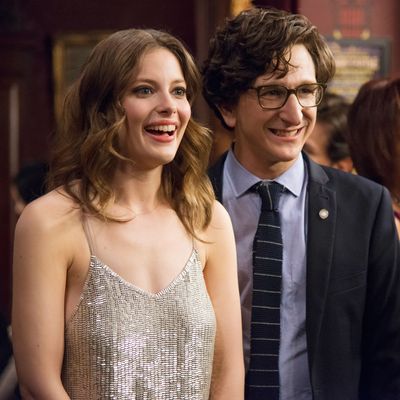
Episode to episode, thereÔÇÖs plenty to like about Love, NetflixÔÇÖs new Judd ApatowÔÇôproduced, Gillian JacobsÔÇôled quasi-rom-com. And if it were released week to week, maybe that would be enough to keep it afloat. But because itÔÇÖs released as all ten episodes at once, and because thatÔÇÖs how I watched it, those strong moments get lost in an expanse of blah. Occasional glimmers of originality get bulldozed by ÔÇ£IsnÔÇÖt Hollywood terrible?ÔÇØ clich├®s, and solid performances get undermined by character incoherence. Any given half-hour of the show can elicit a ÔÇ£Hey, this is pretty goodÔÇØ sensation, and considering the charactersÔÇÖ affinity for getting high, maybe thatÔÇÖs appropriate ÔÇö because the follow-up feeling, moments later, is ÔÇ£Eghghgh, what did I just do?ÔÇØ
Jacobs stars as Mickey, our miserable heroine. She weaves in and out of sobriety ÔÇö┬ánot just abstaining from substance use but participating in AA or NA meetings ÔÇö┬áand spends a few early episodes extricating herself from a very crummy romantic relationship. She works at a call-in Frasier-esque radio show, which weÔÇÖre supposed to perceive as ironic, since she herself is kind of a mess. But sheÔÇÖs so underwritten that we never quite get a handle on what motivates her, exactly. SheÔÇÖs self-destructive, and often just destructive-destructive, and she calls herself ÔÇ£a piece of shit,ÔÇØ but the show never really pushes past these vague assessments. JacobsÔÇÖs absorbing performance leads us to believe thereÔÇÖs a full person under this fidgeting and posturing, but we donÔÇÖt get to see her.
Her counterpart is the equally underwritten Gus (co-creator Paul Rust), an on-set teacher for the teen star (Iris Apatow) of a witch-oriented television show. He gets dumped early on in the pilot, and he and Mickey quickly and coincidentally enter each otherÔÇÖs orbit. Gus is the kind of guy who considers himself nice but really isnÔÇÖt: HeÔÇÖs ineffectual as an educator, judgmental as a suitor, and hot and cold as a companion. Lucky for him, very beautiful women are constantly trying to have all kinds of sex with him.
Love comes from Rust, Apatow, and Lesley Arfin (Girls). Rust and Arfin are married to each other, which perhaps to some degree explains why GusÔÇÖs behavior is framed as okay or even charming when, to an outsider, it feels maddening and immature. Mickey and Gus form the central romance of the show, but the (seemingly) accidental thrust here is not ÔÇ£opposites attractÔÇØ but, rather, ÔÇ£oy, everybody, keep your hands to yourself.ÔÇØ Here are two people who both have a lot of work to do before theyÔÇÖre really going to hatch into the people they want to be. Want to watch them date? Sorry, Love, but the answer is, ÔÇ£Uh, not really.ÔÇØ
Especially when theyÔÇÖre surrounded by people who are lightyears more interesting. MickeyÔÇÖs dirtbaggy ex-boyfriend (Kyle Kinane) joins a weird church, which Mickey begrudgingly attends. IÔÇÖd watch a show about that weird church. Brett Gelman plays MickeyÔÇÖs volatile and confounding boss at the radio station. IÔÇÖd watch a show about him, too. Or about Kerri KenneyÔÇÖs neighbor character. Claudia OÔÇÖDoherty plays MickeyÔÇÖs quirky Australian roommate; that character could have her own show, though honestly, OÔÇÖDoherty would be better off with a separate endeavor. ApatowÔÇÖs signature is how much humanity he tends to find in even minor characters ÔÇö think of the desperate Jonah Hill in The 40-Year-Old Virgin, or the valiant integrity of Mellie on Freaks and Geeks ÔÇö┬áand we see glimpses of that over and over in Love, except in our main characters.
Then we have GusÔÇÖs professional life, which takes up a significant part of the show. For someone whoÔÇÖs had staggering, genre-altering success in Hollywood, Apatow sure does not care for aspects of the entertainment industry. GusÔÇÖs job on the set of WitchitaÔÇö┬áokay, fair is fair, that is a funny title ÔÇö┬ásets up over and over how craven showrunners are, how dumb writers are, how competitive actresses are, and how difficult teen starlets are. Even if IÔÇÖm willing to grant all those premises, IÔÇÖm still not sure what this setup is doing on this show. It doesnÔÇÖt illuminate GusÔÇÖs interior life, it doesnÔÇÖt deepen our understanding of the showÔÇÖs worldview, and it doesnÔÇÖt put anyone in a new light. If itÔÇÖs a metaphor for something, I have no idea what itÔÇÖs representing. Mostly, it just made me wish the series were set anywhere other than Los Angeles.
Given the showÔÇÖs creative team, one feels compelled to compare Love to Girls; given its home on Netflix, to Master of None; given its be-sad-and-smoke-pot-in-L.A. vibes, to YouÔÇÖre the Worst. When itÔÇÖs working, Love can almost sit at that table. The direction is top-notch, and the show is incredibly immersive. Its awkwardness can be searing, and when its characters teeter on the edge of genuine introspection, you can see the glowing potential within the show. When itÔÇÖs its nastiest, poking at the worst parts of its charactersÔÇÖ psyches, thereÔÇÖs an addictive, sadistic glee at play. But unlike its brethren, Love doesnÔÇÖt feel like it has much to say. I like you, Love. But i donÔÇÖt like you like you.

